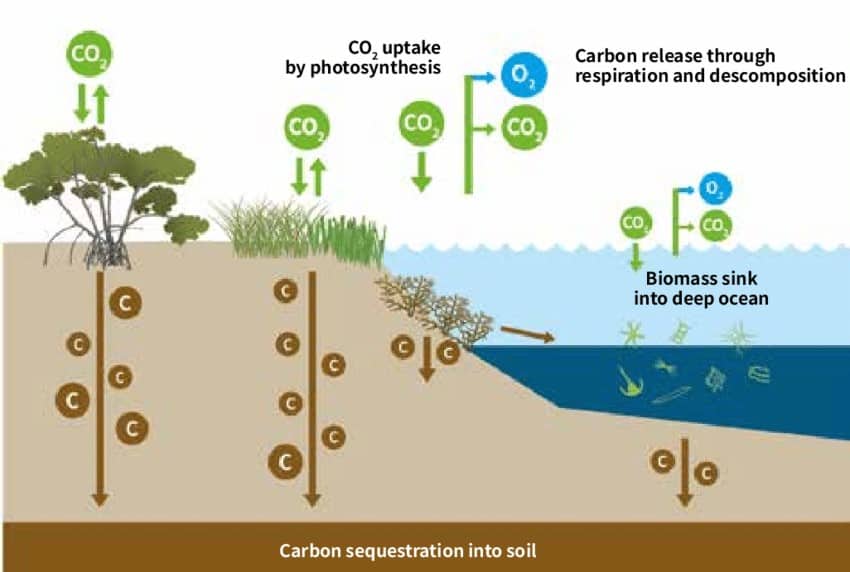The Bahamas plans to sell blue carbon credits on the voluntary carbon market by the end of this year.
The island nation is counting its carbon-sink assets like mangroves and hopes to sell blue carbon credits out of them.
The inventory of its ocean-based assets is still ongoing. But the Prime Minister said they can produce at least $300 million worth of blue carbon credits.
The Role of Ocean-based Carbon Sink in Cutting Emissions
Coastal ecosystems like mangroves and seagrass meadows can store big amounts of CO2. In fact, mangroves store 10x more carbon than terrestrial forests. Mangrove forests usually grow in sea bays.
Also, as mangroves capture and store CO2 below water, it’s sequestered there for over 10x longer than tropical forests do. As such, they have a crucial role in fighting climate change.
The image below shows how a typical blue carbon sink sequesters CO2.
There are other positive effects of coastal forests on climate change and the economy. They help reduce coastal wave energy and the impact of harsh coastal storms and events.
Plus, blue carbon systems also filter pollution and trap sediments that support coastal habitats.
The Bahamas Timely Move with Blue Carbon Credits
Market analysis also shows that global demand for carbon credits is surging as companies are in a race to offset their emissions. Countries are also striving hard to meet their emissions reduction targets.
Countries and businesses alike are setting goals to achieve net-zero emissions by 2050. For the same year, the BloombergNEF, clean energy research team, expects the market for carbon credits to reach as high as above $500 billion.
The carbon market has seen money pouring in on green carbon credits projects, involving forests and grasslands. So if The Bahamas begins selling blue carbon credits, it will be among the first nations to focus on this space.
And the Bahamas PM thinks that it’s time for the country to get paid for the services of its coastal carbon sinks. Philip Davis said that,
“I want to see the Caribbean that is not dumped on any further… We are a major carbon sink for the world, and we need to benefit from cleaning the Earth’s atmosphere.”
The Caribbean contributes very little to global emissions. But the region is among the world’s most vulnerable to climate change.
Hurricanes and other ecosystem damages experienced by the country that cost it $10 billion in national debt are due to the climate crisis.
The Bahamas hopes that other Caribbean nations will join them in this initiative. They’ll be having a regional meeting in the coming weeks.
Meanwhile, the country had recently introduced its landmark legislation to regulate carbon credits. This policy will aid the Bahamas in promoting blue carbon credits and removing CO2 from the air. It will also help boost its coastal conservation and restoration efforts.
Other Plans to Tackle Climate Change
The Bahamas plans to invest the money from selling blue carbon credits in renewable energy and other green projects.
The island nation promised to generate at least 30% of its energy from renewable sources by 2030.
It also seeks to transition its public sector to a fleet of electric cars and retrofit buildings with renewable energy elements. In particular, the government focuses on solar energy projects in various areas.
It partnered with the EU and the Inter-American Development Bank for solar generation and storage. The solar infrastructures will be in places damaged by hurricanes.
There are also plans to use reverse metering to credit people who produce more electricity than they use.
As for its plan to sell blue carbon credits, the Bahamas expects to earn much to fund its transition to renewable energy and be climate-resilient.
As such, carbon markets serve as a bridge to a renewable energy future for nations like the Bahamas.


